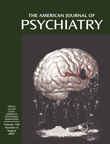Herbal Diuretics and Lithium Toxicity
To the Editor: Herbal products are readily available for purchase over the counter and often are not viewed by patients as medications. Since many herbs have pharmacological effects, significant side effects and interactions with medications are possible yet poorly understood. We report a case of life-threatening lithium toxicity associated with the use of herbal diuretics.
Ms. A was a 26-year-old single white woman with diagnoses of bipolar disorder and alcohol dependence; the latter was in early full remission. For 5 months she had been stable while taking 900 mg b.i.d. of lithium, 2 mg b.i.d. of risperidone, 20 mg b.i.d. of propranolol, 0.5 mg b.i.d. of lorazepam, 100 mg/day of sertraline, and 25 mg b.i.d. of hydroxyzine. Her lithium level on this drug regimen was 1.1 mmol/liter.
Ms. A came to the emergency room complaining of “dizziness,” “grogginess,” and loose stools over the several days since she had begun taking an over-the-counter medication (containing chlorpheniramine, pseudoephedrine, and acetaminophen) for sinus problems. She had stopped taking this medication 2 days before her emergency room visit because of these symptoms. She reported using no other nonprescribed medications, alcohol, or drugs. Her vital signs and the results of a physical examination were normal. She left the emergency room before an ECG was performed or any laboratory work was completed because of anxiety.
Ms. A was seen the next day for a scheduled psychiatric clinic visit and again reported feeling “groggy” but better since she had stopped taking the sinus medication. She was alert and oriented and had no tremor. Again she reported no use of any medications other than those previously mentioned. Two days later, Ms. A returned to the emergency room with complaints of nausea, diarrhea, an unsteady gait, tremor, and drowsiness. At this visit she reported that she had been taking an over-the-counter preparation of herbal diuretics for the past 2–3 weeks for weight loss. She was drowsy but oriented and had a coarse tremor, an unsteady gait, and nystagmus. She was admitted to the coronary care unit with a lithium level of 4.5 mmol/liter.
The preparation used by the patient contained the following ingredients: vitamin B6, potassium, Equisetum hyemale, parsley, paprika, uva ursi, ovate buchu, corn silk, juniper, and bromelain. Equisetum, parsley, uva ursi, ovate buchu, corn silk, and juniper have diuretic properties (1, 2). Although some of these ingredients can be toxic, we know of no case reports documenting adverse effects nor any literature describing the mechanism of action of such herbal diuretics.
It seems likely that the herbal diuretics were responsible for the patient’s lithium toxicity. She had been stable with the same psychotropic medication regimen during the event, and the time course involved makes it unlikely that the over-the-counter sinus medication played a significant role. As there were several herbal diuretics in the preparation used and the mechanism of action of each is unknown, it is impossible to determine which herb or combination of herbs caused the lithium toxicity. This case illustrates the potential for interactions of herbal products with medications and underscores the need for physicians to ask patients directly about any use of herbs.
1. PDR for Herbal Medicines, 2nd ed. Montvale, NJ, Medical Economics, 2000Google Scholar
2. Simpson D: Buchu: South Africa’s amazing herbal remedy. Scott Med J 1998; 43:189-191Crossref, Medline, Google Scholar



